The steps required after installing OIM
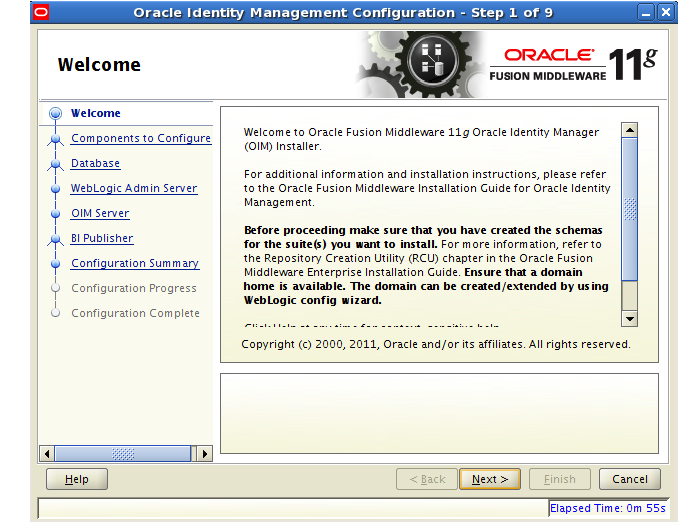
The welcome screen will be presented. Click 'next'.
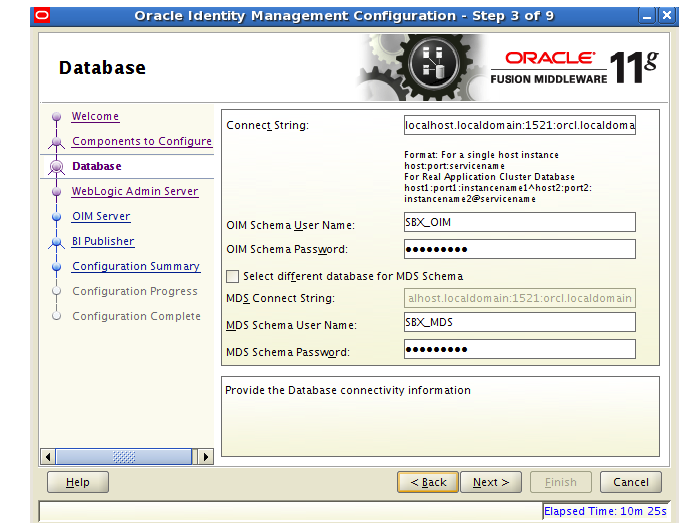
Insert the connection string (which is your hostname, port # and service name)
In this situation:
Hostname = localhost.localdomain
Port number of DB = 1521
Service Name = orcl.localdomain (What is my DB service Name
This then creates a string value of:
localhost.localdomain:1521:orcl.localdomain (What is my Oracle DB service name?)
The OIM and MDS schema credentials used within the creation of the RCU. If you cannot remember the useranme, you can always search for the users within the 'ALL_USERS' table.
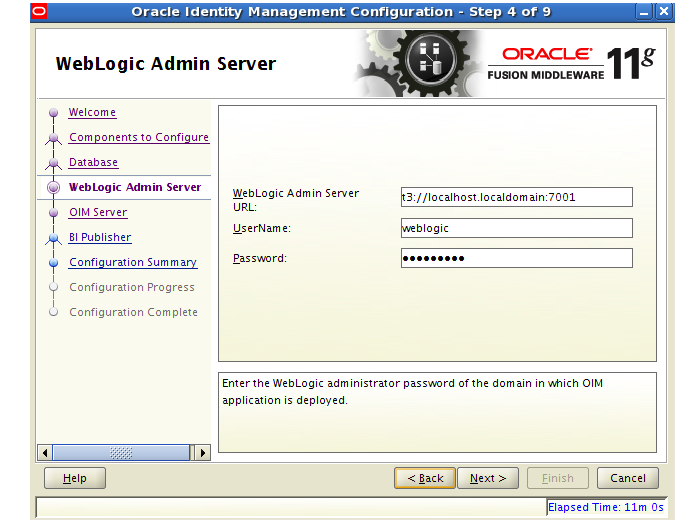
Configure the WLS admin server credentials then click 'next'.
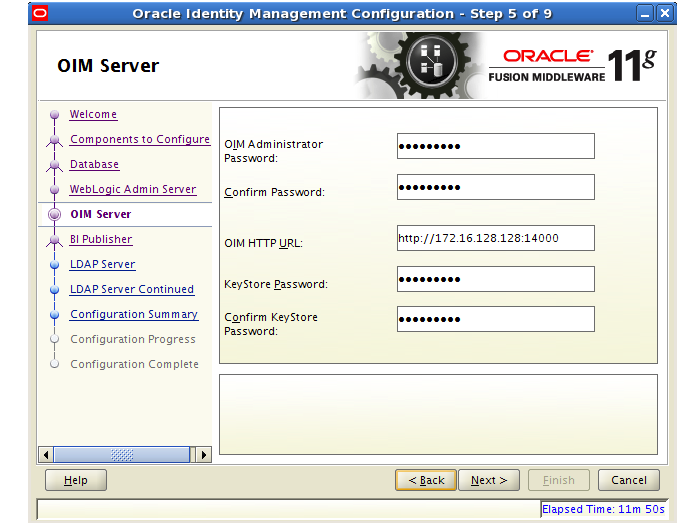
Enter in the desired credentials for OIM then click 'next'.
(It was noticed that the OIM HTTP URL should be the ip address, not the hostname)
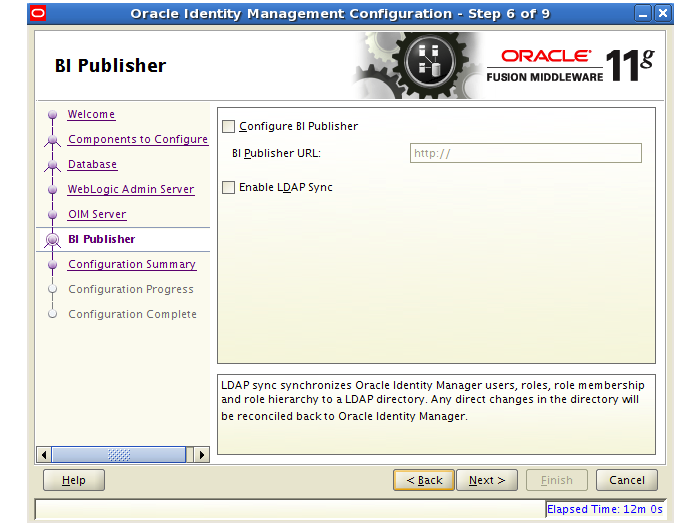
In this installation, we are not installing BI publisher. Click 'next'.
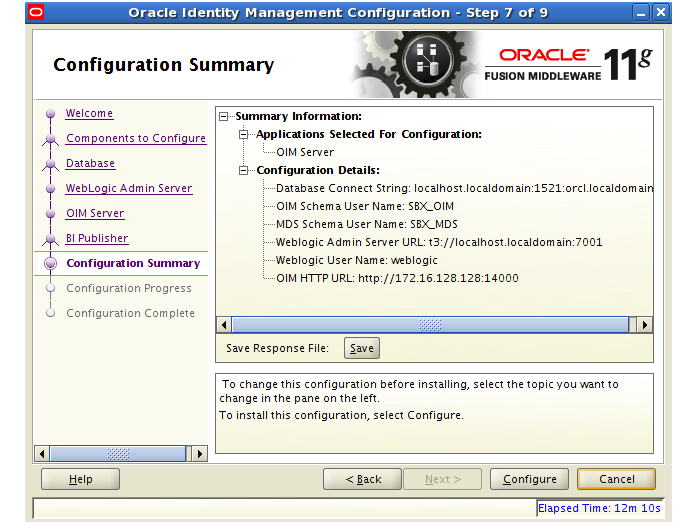
Review the summary then click 'configure'.
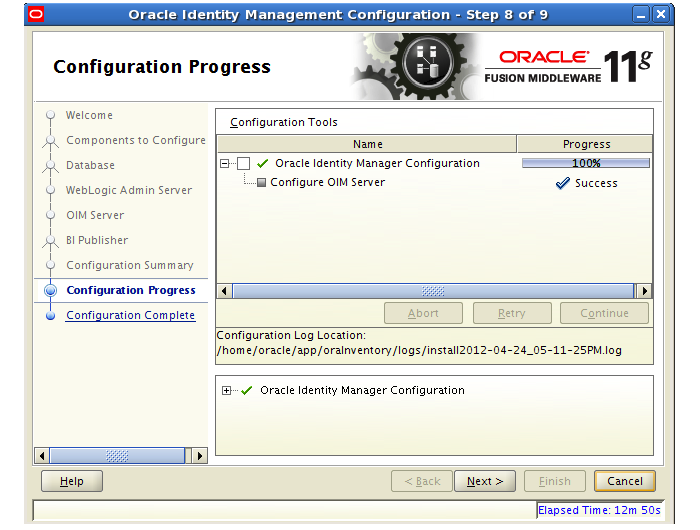
This displayed that OIM was successfully connected. Click 'next'.
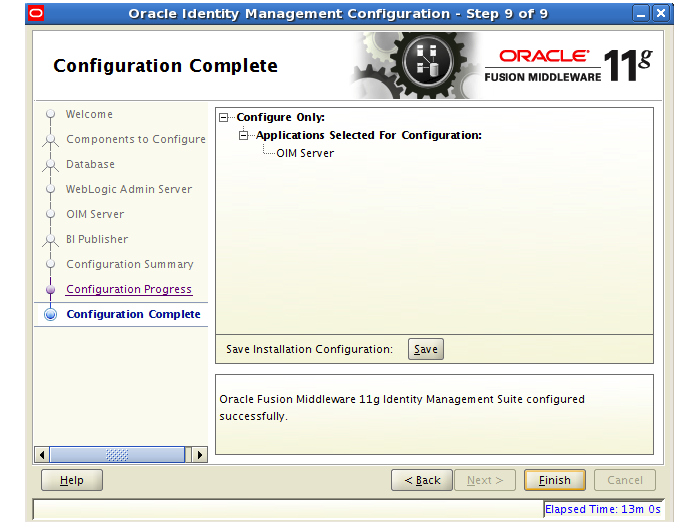
Once these steps have been completed, assuming you have your DB and Weblogic up and running, you can execute the following:
Admin Console = http://localhost.localdomain:7001/console/login/LoginForm.jsp
OIM GUI login: http://172.16.128.128:14000/oim/faces/pages/Login.jspx
Replace the hostname and port numbers which was configured within your environment.
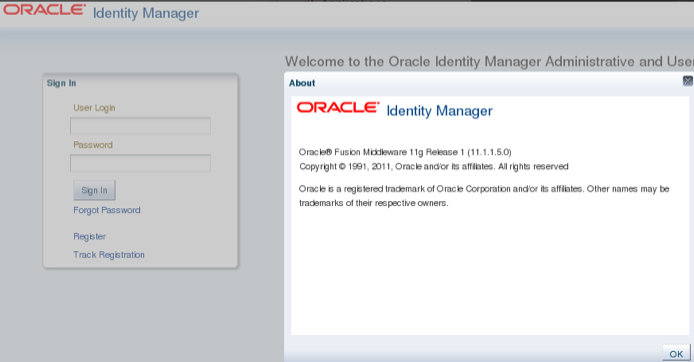
Unable to find keystore "default-keystore.jks" in /config/fmwconfig/.
It's worth noting that the above actions are necessary as part of the installation. There's two config.sh files, 1. in the OIM-HOME/common/bin (which is for the installation of the OFM) and 2. the OIM-HOME/bin (for the configuration). If you don't complete the latter phase, you are likely to get the following error:
...
Truncated. see log file for complete stacktrace
Caused By: oracle.iam.platform.utils.OIMAppInitializationException:
OIM application initialization failed because of the following reasons:
oim-config.xml was not found in MDS Repository.
Unable to find keystore "default-keystore.jks" in
Unable to find keystore ".xldatabasekey" in
Password for OIMSchemaPassword is not seeded in CSF.
Password for xell is not seeded in CSF.
Password for DataBaseKey is not seeded in CSF.
Password for JMSKey is not seeded in CSF.
Password for .xldatabasekey is not seeded in CSF.
Password for default-keystore.jks is not seeded in CSF.
Password for SOAAdminPassword is not seeded in CSF.
...
About the author
 Daniel is a Technical Manager with over 10 years of consulting expertise in the Identity and Access Management space.
Daniel is a Technical Manager with over 10 years of consulting expertise in the Identity and Access Management space.Daniel has built from scratch this blog as well as technicalconfessions.com
Follow Daniel on twitter @nervouswiggles
Comments
Other Posts
AS I was migrating my environment into an S3 environment, I wanted to leverage off the SES services that AWS provide, more specifically, to leverage the off the SMTP functionality by sending an email via PHP
Read More...
The WeMos D1 is a ESP8266 WiFi based board is an extension to the current out-of-the-box library that comes with the Arduino installation. Because of this, you need to import in the libraries as well as acknowledging the specific board. This process is highly confusion with a number of different individuals talking about a number of different ways to integrate.
Read More...
NameID element must be present as part of the Subject in the Response message, please enable it in the IDP configuration.
Read More...
For what I see, there's not too many supportive documentations out there that will demonstrate how provision AD group membership with the ICF connector using OpenIDM. The use of the special ldapGroups attribute is not explained anywhere in the Integrators guides to to the date of this blog. This quick blog identifies the tasks required to provision AD group membership from OpenIDM to AD using the LDAP ICF connector. However this doesn't really explain what ldapGroups actually does and there's no real worked example of how to go from an Assignment to ldapGroups to an assigned group in AD. I wrote up a wiki article for my own reference: AD group memberships automatically to users This is just my view, others may disagree, but I think the implementation experience could be improved with some more documentation and a more detailed example here.
Read More...
In the past, the similar error occurred though for the Oracle Identity Management solution. invalidcredentialexception remote framework key is invalid Because they all share the ICF connector framework, the error/solution would be the same.
Read More...
org.forgerock.script.exception.ScriptCompilationException: missing ; before statement
Read More...
ForgeRock IDM - org.forgerock.script.exception.ScriptCompilationException: missing ; before statement
Read More...
When performing the attempt of a reconciliation from ForgeRock IDM to Active Directory, I would get the following error
Read More...
In the past, the similar error occurred though for the Oracle Identity Management solution. invalidcredentialexception remote framework key is invalid Because they all share the ICF connector framework, the error/solution would be the same.
Read More...
During the reconcilation from OpenIDM to the ICF google apps connector, the following error response would occur. ERROR Caused by com.google.api.client.auth.oauth2.TokenResponseException 400 Bad Request - invalid_grant
Read More...

